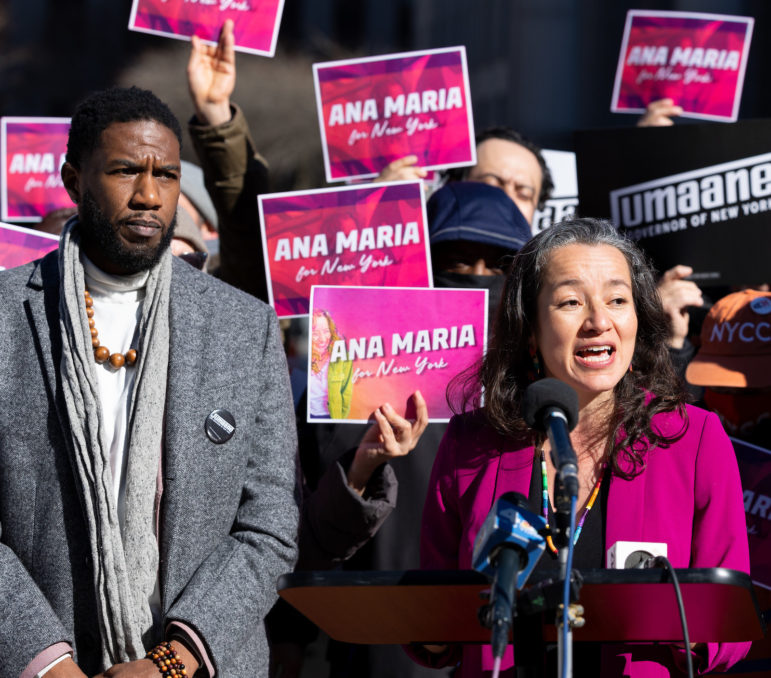Ana Maria Archila, running alongside gubernatorial candidate Jumaane Williams, has focused her campaign around housing, with a radical plan to create or preserve 1 million affordable homes statewide while cutting out speculators and large corporate landlords.

Courtesy Archila campaign
Ana Maria Archila and Jumaane Williams on the campaign trail.Lieutenant governor can be a pretty thankless job for an ambitious New York politician. There’s little actual power, and the person who holds the role tends to function as a surrogate for the person at the top of the ticket.
But as New Yorkers have seen twice in the past 13 years, the governor’s mansion is just a single scandal away from a new occupant.
Three Democrats are facing off for the nomination to serve the state’s second-in-command, each staking out a different lane. There’s the incumbent, Brian Benjamin, who has tied his campaign to the leader who appointed him last September, Gov. Kathy Hochul—herself an ex-lieutenant who benefited from her predecessor’s downfall. Former Brooklyn Councilmember Diana Reyna has linked up with Rep. Tom Suozzi to challenge Hochul-Benjamin from the right.
And then there’s the progressive candidate, Ana Maria Archila, the recent co-executive director of the Center for Popular Democracy and the former head of Make the Road New York. She is campaigning alongside Jumaane Williams, a gubernatorial candidate and New York City’s public advocate.
Archila has focused her campaign around housing, with a radical plan to create or preserve 1 million affordable homes statewide while cutting out speculators and large corporate landlords. Archila and Williams unveiled their plan last month at an event in Hudson Yards—a development symbolic of the type of luxury housing project they say they will not pursue if elected to lead the state.
“Everywhere I go, people tell me that they worry about losing their homes,” Archila said Sunday during an interview on WBAI’s City Watch. “My core priority would be to keep people in their homes, to house people who don’t have a home and to make sure people who are homeowners do not feel crushed by taxes.”
So how would the pair of progressives achieve their affordable housing goals? The work, Archila said, begins with a radical reorientation of Empire State Development (ESD), the state public benefits corporation tasked with bolstering New York’s economy and financing development. Archila said ESD should focus on investing in the creation of affordable housing rather than corporate projects.
“It has been used as an entity that keeps promoting development projects that are not building affordable housing, that are not creating the jobs that are promised,” Archila told City Watch.
“Housing is the most stabilizing kind of social infrastructure that we have,” she added. “In New York, we have so much wealth but we also have a crisis of homelessness and people are just walking around constantly afraid that they won’t be able to afford the place that they live.”
Her housing plan specifically calls for ESD to “to build a network of housing that is publicly-owned, publicly-financed, and publicly-built.” ESD would finance the development on public land, then partner with nonprofits and “qualified housing operators” to maintain permanently affordable units, the plan continues.
Households would pay 30 percent of their income toward rent, meaning wealthier tenants would subsidize the rents of lower-income neighbors. That concept, known as social housing, is prevalent elsewhere in the world. In Vienna, Austria, about 60 percent of the population lives in social housing. In Singapore, 80 percent of residents live in government-built apartments.
“This system will lower the cost of providing housing by making it accessible to middle income people who can pay a higher rent, and by eliminating the drive for profit that characterizes our current affordable housing systems,” Archila and Williams’ plan states.
“In essence, we will create a public option for housing that serves a social purpose, instead of development that just feeds private markets,” they add.
In a statement Monday, an ESD spokesperson disputed Archila’s characterization and said corporation does focus on affordable housing development. The spokesperson said New York is nearing a goal of creating or preserving 100,000 affordable homes and pointed to a number of projects with income-restricted units supported by the corporation and financed by the state’s Division of Homes and Community Renewal. The buildings include The Fountains, a roughly 1,163-unit affordable complex in East New York completed last year; the ongoing redevelopment of the Kingsboro Psychiatric Center campus in Flatbush into affordable housing; and the Vital Brooklyn Initiative for Central Brooklyn. A controversial development plan around Penn Station would include about 500 affordable apartments, according to its General Project Plan.
“Investment in affordable housing is a must, and so is income to pay the rent,” the spokesperson said. “As we recover from a pandemic that has devastated our state’s economy, ESD is laser focused on its mission of building an economy that works for all New Yorkers. “
Archila’s plan may seem pie-in-the-sky given the realities in Albany, where even housing subsidies backed by real estate, tenants groups and legislative leaders can wither during budget negotiations. Popular opinion has also snapped back to more moderate positions after progressive victories in 2019 and 2020.
Yet, housing remains the chief concern of New York City residents—who make up the bulk of state Democratic primary voters—according to an expansive survey conducted by the city’s NYC Speaks initiative.
Archila said she remains hopeful that progressive policies will prevail because the state has so far failed to address its decades-long housing and homelessness crises.
“What gives me hope every day and has kept me hopeful for the 20 years that I’ve been organizing is the courage of people who fight for one another,” she said. “The fact that in a global pandemic people found ways to take care of one another.”
“The task for elected officials in this moment is to match the courage of the people they lead,” she added. “It requires them protecting the progress we have made. It requires them especially to lean into a vision that keeps everyone included.”
The April 3 episode of City Watch also featured an interview with City & State Albany politics reporter Zach Williams, who detailed the budget negotiations and stalled redistricting plans.
Listen to the full interview here:
This story has been updated with a response from Empire State Development.










3 thoughts on “City Watch: Progressive Running for Lieutenant Gov. Goes Big on Housing”
‘Social Housing’ = NYCHA 2.0, another endless drain on NYC taxpayers money. Go away.
‘Households would pay 30 percent of their income toward rent, meaning wealthier tenants would subsidize the rents of lower-income neighbors. That concept, known as social housing, is prevalent elsewhere in the world. In Vienna, Austria, about 60 percent of the population lives in social housing. In Singapore, 80 percent of residents live in government-built apartments.’
Do you think any wealthier tenants would be stupid enough to move somewhere where they will be subsidizing other tenants? Only a sucker would sign up for a sh*t deal like that.
I wish it was clearer how high the subsidized rents have to be to pay for the lower income households, or, conversely, how low the contribution from the low income households can be before the building revenues are insufficient to maintain the building.
Someone making 12,000/month is on the high end of middle class and would be paying $3,600/month in rent under a 30% plan. For $3,600/month, they could afford a lot of other options: other places to rent, or, if they have the kind of savings that come with that salary level over time, maybe they just buy a condo or co-op and save on maintenance vs. rent that goes with ownership typical in NYC.
Conversely, someone making just $1200/month would be paying $360/month, barely enough to cover even a small fraction of upkeep. It might require 2-4 “normal” renters to cover that person’s unit.
I’m not saying Social Housing can’t work, but both the low end and high end need to be defined and understood better.
The whole ‘social housing’ model is not realistic because such housing by it’s nature does not appeal to people in the $12k/month demographic for the reasons you state. Higher income people do not want to risk their safety and quality of life by living in the same building as low income people.